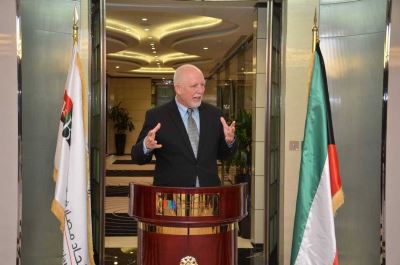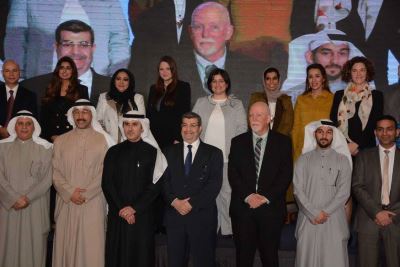Tackling Corruption

WSU professors invited to ethics conference in Kuwait
After an impromptu, three-hour interview on a popular Kuwaiti radio show, Drs. Richard Greene and Rachel Robison-Greene were asked to choose music for the show’s “Disco Day” rewind.
“They had us pick all the songs,” Greene recalled. “At 3 p.m., they played the call to prayer and everyone got down on their mats to pray. It was really beautiful. As soon as the prayer was over, they started our playlist. It was fun, but what was incredible was the time we had to discuss ethics, corruption, moral decision making, moral problem solving and more,” Greene said.
Greene and Robison-Greene are philosophy professors at Weber State University. Robison-Greene coaches the WSU ethics bowl team, and Greene is the chair of the National Intercollegiate Ethics Bowl. He is also director of the Richard Richards Institute for Ethics, which works to promote ethical behavior at all levels of government and business. The institute teaches and inspires ethical leadership, encourages active participation in public service, promotes political reform and provides scholarships to students interested in local, national and world politics.
In December 2017, they were invited to participate in Kuwait’s first practical and professional ethics forum. Greene was one of four keynote speakers, along with the heads of the organizations sponsoring the conference.
“Our role was to talk about how important it is to have ethics in your governmental policies and what that might look like,” Greene said. “We went beyond the regulations and talked about how people can work out their differences in a civil and rational way by getting to the heart of the matter.”
 By the end of the conference, the proceedings were presented to parliament along with a demand for harsher penalties for those who violated the principles of professional and practical ethics. The event was widely considered a success.
By the end of the conference, the proceedings were presented to parliament along with a demand for harsher penalties for those who violated the principles of professional and practical ethics. The event was widely considered a success.
“I think overall the conference was vastly successful,” Greene said. “It got a lot of media attention and was recognized at some of the highest levels. The conference put issues out there that had been previously swept under the rug.”
Greene also described the conference as an event of historical significance, because this was the first time Kuwait had publicly sought to address its corruption issues. Though Greene and Robison-Greene knew they had been invited for a conference on ethics, they weren’t fully aware of the significance or of the roles they would be playing until they arrived.
“One thing that was striking in our experience was that we had to roll with the punches,” Robison-Greene said. “We had two main responsibilities at the conference: the first was to participate in panels and the second was to lead workshops with employees sent by different organizations. We did ethics bowl cases with them so they could engage issues directly.”
These ethics bowl cases involved one- to two-page scenarios describing a situation that had actually happened, after which participants were asked to role play and reach a hypothetical resolution.
“First we’d break them into groups, then we would discuss,” Robison-Greene said. “And it was interesting, because some of them got really animated. They would get up in one another’s faces, but then those two people would sit next to each other and chat pleasantly. People really cared about these issues.”
This passion, Robison-Greene added, was evident all throughout the conference and was ultimately what made it so successful.
“There are corruption problems there,” Robison-Greene said, “but the people that we were interacting with were the people who really wanted to change things, and there was a very strong sense of representation there. A lot of passionate people are working hard to end corruption.”